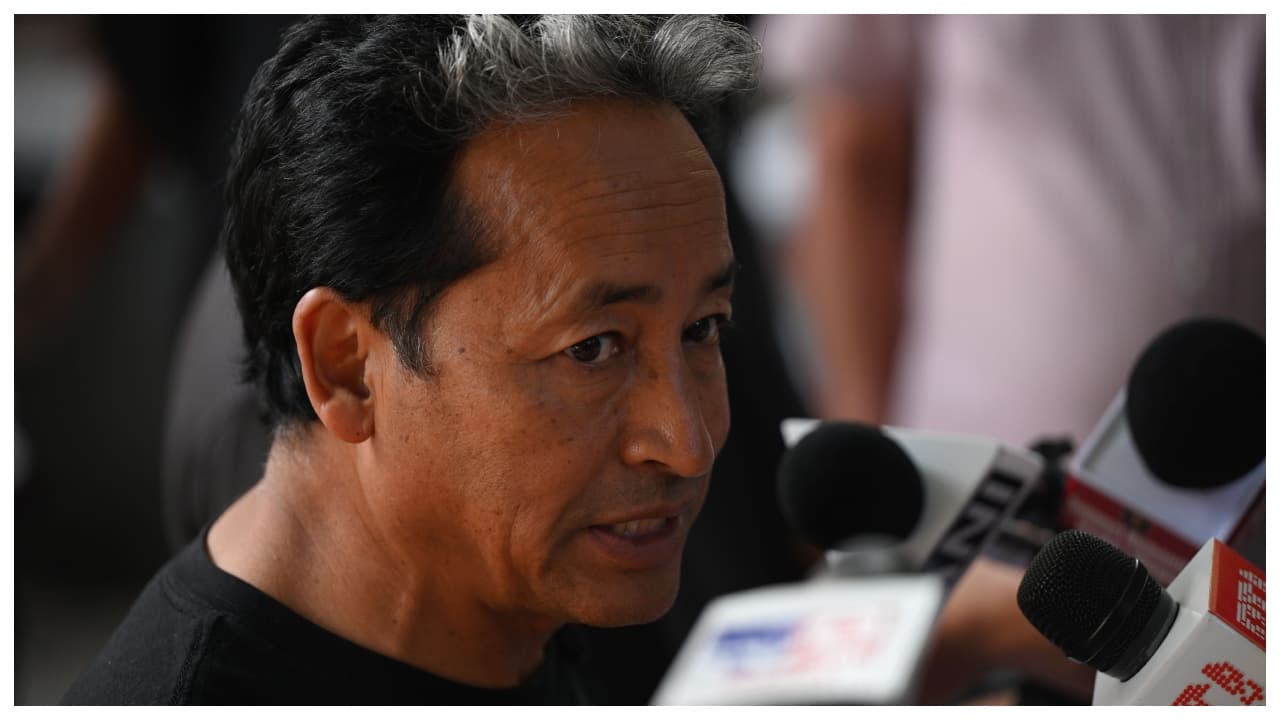SC adjourned the hearing of the petition filed by Sonam Wangchuk’s wife challenging his detention under NSA, postponing further proceedings to October 14. The court has sought responses from the Government, administration of Ladakh and Jodhpur jail.
Supreme Court on Monday adjourned the petition filed by Ladakh-based activist Sonam Wangchuk’s wife challenging his detention under the National Security Act (NSA). SC raised a pointed query to the Centre on why Wangchuk’s wife, Gitanjali J. Angmo, had not been given prior notice of the grounds of her husband’s detention. Appearing before the bench of Justices Aravind Kumar and N.V. Anjaria, Angmo informed the court that since Wangchuk’s detention on September 26, she has not been permitted to meet him in Jodhpur jail.
Her plea, filed under Article 32, is a habeas corpus petition asserting that Wangchuk’s continued confinement violates Article 22 of the Constitution, which provides safeguards against arbitrary preventive detention. She argued that neither she nor her husband has been told the reasons for the arrest, making the detention not only unconstitutional but also procedurally defective. Taking note of these submissions, the Supreme Court issued notices to the Centre, the Union Territory of Jammu & Kashmir and the state of Rajasthan, and directed them to file responses. The bench stressed that fundamental rights and procedural fairness must be respected in preventive detention cases. The matter has now been listed for further hearing on October 14, when the government’s replies are expected to be examined.
Sonam Wangchuk’s detention and custody
On September 26, Wangchuk was detained by the Deputy Commissioner of Leh under Section 3(2) of NSA. The detention followed violent protests in Leh on September 24, during a demonstration demanding statehood for Ladakh and inclusion under the Sixth Schedule of the Constitution. During that unrest, four people died and many were injured. Soon after his detention, Wangchuk was transferred to Jodhpur Central Jail in Rajasthan, over 1,000 kilometres away from his native Ladakh.
Authorities contend that Wangchuk made ‘provocative speeches’, referencing Arab Spring and protests in Nepal, which allegedly instigated violence and damage in Leh.
Separately, his NGO’s FCRA (Foreign Contribution Regulation Act) license was cancelled by the Ministry of Home Affairs, citing violations and misuse of foreign funds, including allegedly conducting ‘studies on sovereignty’.
Under the NSA, authorities must provide grounds for detention within a maximum of 15 days and the detainee may file a representation. A three-member Advisory Board must review the detention within three weeks, and if it finds no sufficient reason, the detainee must be released.
Wife’s Plea in Supreme Court
On October 2, Gitanjali J. Angmo, Wangchuk’s wife, filed a habeas corpus petition in the Supreme Court seeking his immediate release and challenging the invocation of the NSA. In her plea, she contended:
The detention is illegal, arbitrary, and unconstitutional, violating Articles 14, 19, 21, and 22 of the Constitution. Neither Wangchuk nor his family has been provided a copy of the grounds of detention.
She claims she is under virtual house arrest in Leh, and that the administration has harassed staff, students, and associates of his institute, the Himalayan Institute of Alternatives, Ladakh (HIAL). She also refuted allegations of a ‘Pakistan link’ or misuse of funds, calling them ‘misplaced’ and part of a ‘witch-hunt’.
She requested that the authorities present medical reports, detention orders, and all records related to his case before the court.
Supreme Court Hearing and Adjournment
On October 6, a bench of Justices Aravind Kumar and N. V. Anjaria began hearing the petition. The court issued notices to the Central Government, the Ladakh Administration, and Jodhpur Jail authorities, seeking responses.
During submissions, Solicitor General Tushar Mehta informed the court that the detention order had already been served. The bench queried whether Wangchuk and his family had received the order.
Senior advocate Kapil Sibal, representing Wangchuk’s wife, countered that neither Wangchuk nor his family had received the grounds of detention or other documents. He argued that the detention was unlawful.
The court observed that the wife should have access to such documents and that procedural fairness needed to be ensured. However, the bench adjourned further hearings to October 14. Until then, Wangchuk remains in Jodhpur jail under NSA detention.
Legal and political Implications
The government must now respond to the Supreme Court’s notice and produce records related to detention. The validity of the NSA invocation will likely be seriously examined, especially whether procedural safeguards such as timely communication of grounds were followed.
The distance of Jodhpur from Ladakh and allegations of house arrest and harassment of associates, add weight to claims of political motive. The outcome could influence how the NSA is used against activists and dissenters, especially in sensitive regions.
On October 14, the Supreme Court will hear the Centre’s response, possibly examine the detention records, and decide whether Wangchuk’s detention is sustainable. If the court finds procedural lapses or no sufficient grounds, it can order his release or direct that the detention be revoked. Alternatively, the court may order further inquiry or impose conditions for release under supervision.
(With inputs from agencies)
